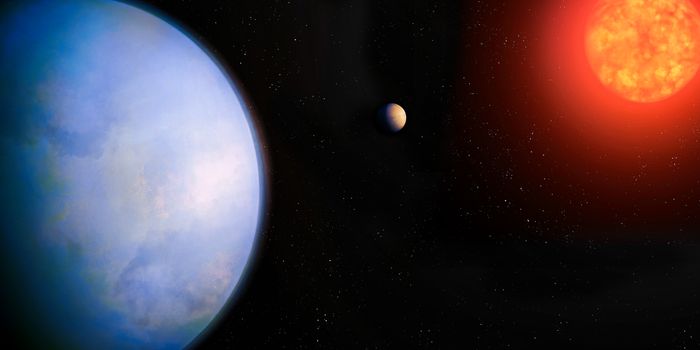Astronomers Detect Water on Nearby Hot Jupiter-Like Exoplanet
Any time we are able to discover water anywhere in the universe besides Earth, it’s a pretty spectacular finding. Water is one of the essential chemicals that makes life possible here on Earth, so it’s assumed that if we are able to find it anywhere else, that there might be a slight change of life processes in these other places as well.
The most recent discovery of water outside of Earth is that of a well-documented exoplanet dubbed 51 Pegasi b, which resides about 50 light years away from our home planet. The findings are available on arXiv.org.
Image Credit: ESO/M. Kornmesser/Nick Risinger (skysurvey.org)
The finding of water in 51 Pegasi b’s composition was pretty much the result of curiosity. Researchers were using the CRyogenic high-resolution InfraRed Echelle Spectrograph (CRIRES) at the Very Large Telescope (VLT) in Chile to take a gander at the exoplanet’s day-side atmosphere when they came across the finding.
They spent time observing the exoplanet for up to four hours rather than taking just a single snapshot. This long-term observation gave the researchers the opportunity to collect 42 spectra of the light that the exoplanet reflected from its host star as It was orbiting, a process during which the exoplanet was moving towards and away from the Earth.
It was apparently this very movement that made it possible to detect the water traces in the atmosphere at such a great distance. “The detection is pretty rock solid,” study co-author Matteo Brogi, from the University of Colorado, Boulder said in a statement.
Interestingly, while water has been detected on other exoplanets before, this was a particularly interesting case since 51 Pegasi b was not transiting its star at the time of the observation. That said, this was essentially the first time that a team was able to make a water-distinguishing observation while the exoplanet and its host star were side-by-side, rather than transiting.
While the exoplanet itself is probably unlikely to hold traces of life even though it contains traces of water, it’s still a pretty big finding. It’s not every day that you’d find water on an exoplanet with the kind of ‘hot’ conditions that this one probably exhibits.
51 Pegasi b is a hot Jupiter-like exoplanet, and because it orbits its host star so closely that it completes an orbit in around 10 days, you would think it would be too hot there for water to exist; well, that’s what astronomers thought too, until of course they found otherwise.
Because it’s a gassy exoplanet, similar to Jupiter in many ways, the water wasn’t found on any “surface” of any kind. Instead, it was found in the atmosphere in the form of vapor, which is also the most easily-observable quality of any exoplanet from such great distances.
Still, at 50 light years away, there are still a lot of untapped mysteries of 15 Pegasi b, and they might remain mysteries for quite a while. Nevertheless, this new water-detection method for distant hot Jupiter-like exoplanets may be applicable to other exoplanets in the galaxy, so it should be interesting to see if astronomers turn up any other traces of water anywhere else.
Source: Phys.org









